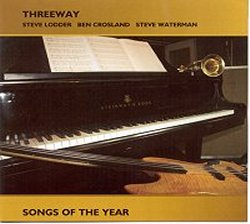
by Ian Mann
October 24, 2009
/ ALBUM
A quiet delight and an album that sounds good whatever the season
Threeway is a drummerless trio nominally led by bassist Ben Crosland and also featuring Steve Waterman ( trumpet and flugelhorn) and Steve Lodder (keyboards). Crosland is based in Huddersfield from where he runs his Jazz Cat record label and although a proud Northerner who has resisted the temptation to move to London he is more than just a good “regional” musician. Crosland’s playing and writing skills have seen him work regularly with nationally known musicians such as Lodder and Waterman plus Alan Skidmore, Mark Nightingale, John Etheridge and many others.
Crosland has also recorded frequently, leading his own groups in quartet, quintet and octet formats and often adopting “northern” themes as the inspiration for his writing. Threeway made their recording début in 2005 with the excellent “Conversations” and although their brand of “chamber jazz” may invite comparisons with Acoustic Triangle Crosland’s group is less obviously into a kind of jazz/classical hybrid and consequently Threeway’s music is more conventionally “jazzy”.
The inspiration for “Songs Of The Year” originally came from the 2003 Marsden Jazz Festival when Crosland’s quintet featuring Waterman, Rod Mason (saxes), Stuart McCallum (guitar) and Dave Walsh (drums) appeared with special guest Lodder. Crosland wrote eight pieces of music based on the English calendar and climate for the festival and the group’s performance was very well received. In the coming years Crosland wrote four similarly themed pieces bringing the total up to twelve. He wanted to record them but was initially uncertain of which instrumental line up to adopt. The overwhelmingly favourable critical reaction to “Conversations” plus the involvement of Waterman and Lodder in the initial project led to the recording being made in the Threeway format and it has to be said that Crosland’s writing suits the trio very well.
“Crystal Morning” opens the album and together with the later “Last Summer” was the first piece to be written for the Marsden Festival performance. With “Crystal Morning” Crosland was trying to portray “the optimism of an icy, sunlit winter day”, something the brisk sharpness of Waterman’s trumpet does superbly. Lodder’s crystalline piano is also faithful to the tune’s subject matter and Crosland’s springy electric bass provides the bounce and optimism.
It’s not surprising that much of this music has a strong pictorial quality and “Frosty Night, Cosy Fire” does what it say on the tin. Crosland’s rounded bass and Waterman’s warm, rich flugel are the fire, Lodder’s piano the touch of frost. However the musical interaction between the three protagonists is excellent, all are superb technicians but there is a warmth and soul about the playing that is exceptional.
Waterman gives full reign to his prodigious technique in “Sunshine and Showers” presaging a solo passage from Lodder on acoustic piano. Lodder is a superb pianist who is also at home in classical contexts and his vaulting solo here is a delight. I’m not always as keen on his playing of electric instruments which can veer toward the bland but on this album this side of his playing is sparingly and tastefully utilised. Electric piano is heard on the following “Renewal” the new instrumental voice suggesting the arrival of spring after the “glacial/winter” sound of the acoustic.
For “Lazy Heat” Lodder deploys a Hammond organ sound alongside Waterman’s muted trumpet and Crosland’s liquid bass. There’s a lazy, bluesy quality about the music that suggests a summer heat haze.
“The Harvest” opens with Waterman unaccompanied before he is joined by Lodder’s piano. There’s a warm, almost hymnal quality about the music suggesting a bountiful harvest indeed. Lodder’s piano solo throws in gospel elements, the sound of thanksgiving. It’s uplifting stuff as is the languid “Wine Under The Stars”.
“Cats And Dogs” exhibits a greater urgency through Waterman’s bright, boppish trumpeting and Lodder’s cascading piano solo. Intended as a depiction of summer thunder storms I suspect.
One of the first pieces to be written for this “song cycle” “Summer’s End” is intended to evoke a sense of melancholy which it does superbly building from Crosland’s bass intro through the choked intensity of Waterman’s trumpeting and Lodder’s sometimes sombre piano.
The warmly glowing “Autumn Dance” evokes the season of “mists and mellow and mellow fruitfulness” with Waterman in particularly impressive form.
“Storm Warning” re-introduces electric piano which trills in mercurial fashion but the music on this track isn’t nearly as aggressive as the title might suggest. Lodder’s stabbing keyboards and Waterman’s trumpet pyrotechnics imply rather than illustrate the coming storm.
“Hymn For Christmas” is a suitably elegiac closer to a charming album. There is a pastoral quality to “Songs Of The Year” that suggests an English idyll and Crosland reveals himself to be an excellent writer and “musical illustrator”- there are some great tunes here. However the album never lapses into folk whimsy, there are far too many strong musical ideas and genuine jazz playing for that. All three players have superb chops which stand up well in this exposed musical setting and the spirit of discipline and group interaction is strong throughout. “Songs Of The Year” is a quiet delight and an album that sounds good whatever the season.
blog comments powered by Disqus